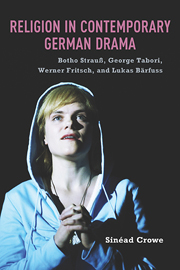 Religion in Contemporary German Drama
Religion in Contemporary German Drama Published online by Cambridge University Press: 05 May 2013
INSOFAR AS RELIGION AND THE ARTS BOTH ATTEMPT to interpret and give meaning to human existence, it could be argued that they have always been linked, and indeed that together they belong to the roots of culture. It is often claimed, however, that theater has an especially close bond with the ritual dimension of religion. This chapter aims to introduce briefly some important ideas about the nature of this bond. I begin by discussing the theory that ancient and medieval theater emerged out of cultic and Christian rites. I then turn to contemporary performance theory, which leaves aside the question of whether theater emerged out of ritual or vice versa and instead examines the performative connections between the two. While many modern theater-makers have been at pains to defend the idea that theater and religion are closely related, it should be remembered that there has been great antagonism between theater and religion at various points in Western history. Thus the chapter concludes with a brief overview of the Christian antitheatrical prejudice.
Theories of Ritual Origins
The theater historian Eli Rozik finds the earliest expression of the theory that there is a fundamental bond between theater and religion in the writings of nineteenth-century French author Charles Magnin. This view became more widespread toward the end of the nineteenth century, when some highly influential, if scientifically dubious, scholarship emerged contending that the earliest forms of theater originated in cultic rituals.
To save this book to your Kindle, first ensure [email protected] is added to your Approved Personal Document E-mail List under your Personal Document Settings on the Manage Your Content and Devices page of your Amazon account. Then enter the ‘name’ part of your Kindle email address below. Find out more about saving to your Kindle.
Note you can select to save to either the @free.kindle.com or @kindle.com variations. ‘@free.kindle.com’ emails are free but can only be saved to your device when it is connected to wi-fi. ‘@kindle.com’ emails can be delivered even when you are not connected to wi-fi, but note that service fees apply.
Find out more about the Kindle Personal Document Service.
To save content items to your account, please confirm that you agree to abide by our usage policies. If this is the first time you use this feature, you will be asked to authorise Cambridge Core to connect with your account. Find out more about saving content to Dropbox.
To save content items to your account, please confirm that you agree to abide by our usage policies. If this is the first time you use this feature, you will be asked to authorise Cambridge Core to connect with your account. Find out more about saving content to Google Drive.